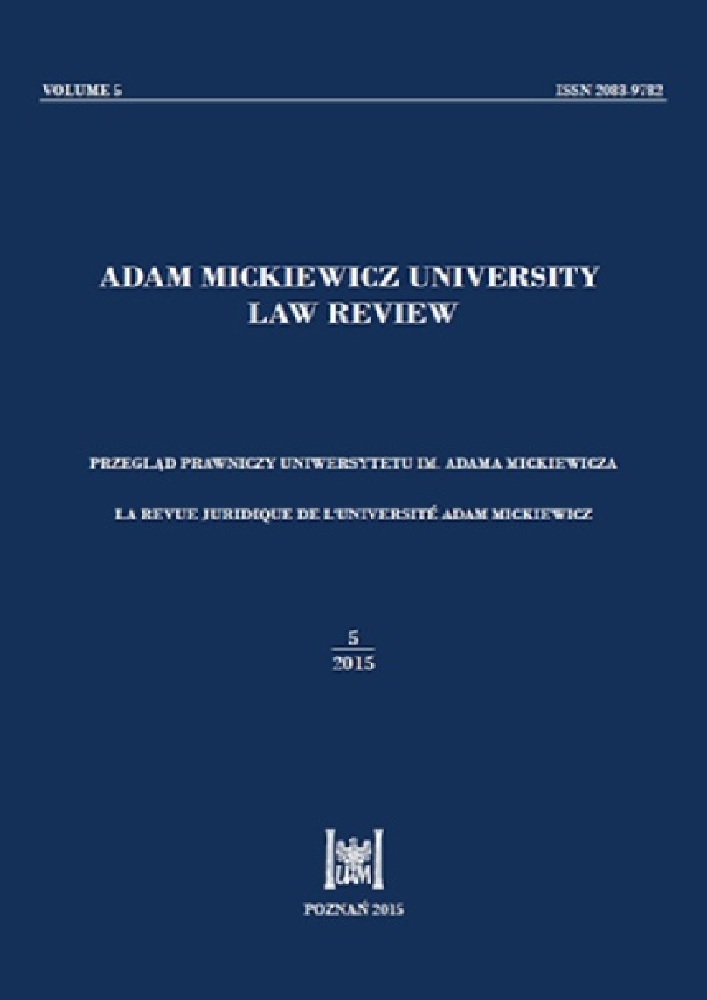Abstract
Wildlife traffickindg of endangered species is an international crime that is increasing in in terms of its significance and position in the global crime hierarchy. This phenomenon is a significant subject of research for both traditional and green criminology. The representatives of green criminology, when discussing the criminal policy in matters related to green crimes, refer to its broad meaning. From this perspective, “green criminal policy” includes: a) the legal and social approach, b) a regulatory system that emphasizes social arrangements, norms and reforms in the production and consumption system; and c) a system of social interactions. Each of these models is presented in the article. In this context, the results of qualitative research on the state of the social control of illegal trade in wild fauna and flora in Poland will also be cited.
Funding
The project was created as a result of the research project No. UMO-2015/19/D/HS5/00105 financed by the funds of the National Science Centre (NCN).
References
Bezerra-Santos, Marcos A., Jairo A. Mendoza-Roldan, R. C. Andrew Thompson, Filipe Dantas-Torres, and Domenico Otranto. “Illegal Wildlife Trade: A Gateway to Zoonotic Infectious Diseases.” Trends in Parasitology 37, iss. 3. 2021: 181–184. DOI: https://doi.org/10.1016/j.pt.2020.12.005
Cao Ngoc, Anh, and Tanya Wyatt. “A Green Criminological Exploration of Illegal Wildlife Trade in Vietnam.” Asian Journal of Criminology 8, no. 1. 2013: 129–142. DOI: https://doi.org/10.1007/s11417-012-9154-y
Cook, Dee, Martin Roberts, and Jason Lowther. The international wildlife trade and organized crime: A review of the evidence and role of the United Kingdom. <https://www.academia.edu/8178488/The_International_Wildlife_Trade_and_Organised_Crime_a_review_of_the_evidence_and_the_role_of_the_UK>, access: 13.02.2022.
Drzazga, Edyta. “Kontrola społeczna nielegalnego obrotu dziką fauną i florą Polsce.” In Prawo publiczne i prawo karne w XXI wieku. Wybrane zagadnienia, edited by Łukasz Pilarz. Lublin, 2019: 104–107.
van Duyne, Petrus C. “The Phantom and Threat of Organized Crime.” Crime, Law & Social Change, no. 24. 1996: 341–377. DOI: https://doi.org/10.1007/BF01298354
Gutmann, Amy, and Dennis Thompson. Why Deliberative Democracy?. Princeton, 2004 DOI: https://doi.org/10.1515/9781400826339
Kepel, Andrzej, Anna Grebieniow, and Borys Kala. Ginące gatunki w sieci – raport. PTOP „Salamandra”. Poznań, 2004.
Muhhamad, Bilal. Rural Crime and Rural Policing Practises (Multicultural Law Enforcement). Detroit, 2002.
Naim, Moisés. Illicit: How smugglers, traffickers and copycats are hijacking the global economy. London, 2005.
Nurse, Angus. Animal Harm. Perspectives on Why People Harm and Kill Animals. London, and New York, 2013.
Nurse, Angus. Policing Wildlife. Perspectives on the enforcement of wildlife legislation. Basingstoke, 2015. DOI: https://doi.org/10.1057/9781137400017
Pływaczewski, Wiesław. “Organizacje pozarządowe na tle problematyki nielegalnego handlu chronionymi gatunkami dzikiej fauny i flory.” Studia Prawnoustrojowe, no. 13. 2011: 265–288.
Reiner, Robert. The Politics of the Police, Oxford, 1992.
Reiner, Robert. The Politics of the Police, Oxford, 2000.
Stelmach, Jerzy, Bartosz Brożek, and Wojciech Załuski. Dziesięć wykładów o ekonomii prawa. Warszawa, 2007.
Wellsmith, Melanie. “Wildlife Crime: The Problems of Enforcement.” European Journal on Criminal Policy and Research. 2011: 125–148. DOI: https://doi.org/10.1007/s10610-011-9140-4
Weitzenfeld, Adam, and Melanie Joy. “An Overview of Anthropocentrism, Humanism, and Speciesism in Critical Animal Theory.” Defining Critical Animal Studies. 2014: 3–27.
White, Rob. “Ecocentrism and criminal justice.” Theoretical Criminology 22, iss. 3. 2018: 342–362. DOI: https://doi.org/10.1177/1362480618787178
White, Rob, and Diane Heckenberg. Green Criminology. An introduction to the study of environmental harm. London and New York, 2014. DOI: https://doi.org/10.4324/9780203096109
Wyatt, Tanya. Wildlife Trafficking A Deconstruction of the Crime, the Victims and the Offenders. London, 2013 DOI: https://doi.org/10.1057/9781137269249
License
Copyright (c) 2022 Edyta Drzazga

This work is licensed under a Creative Commons Attribution-NoDerivatives 4.0 International License.

